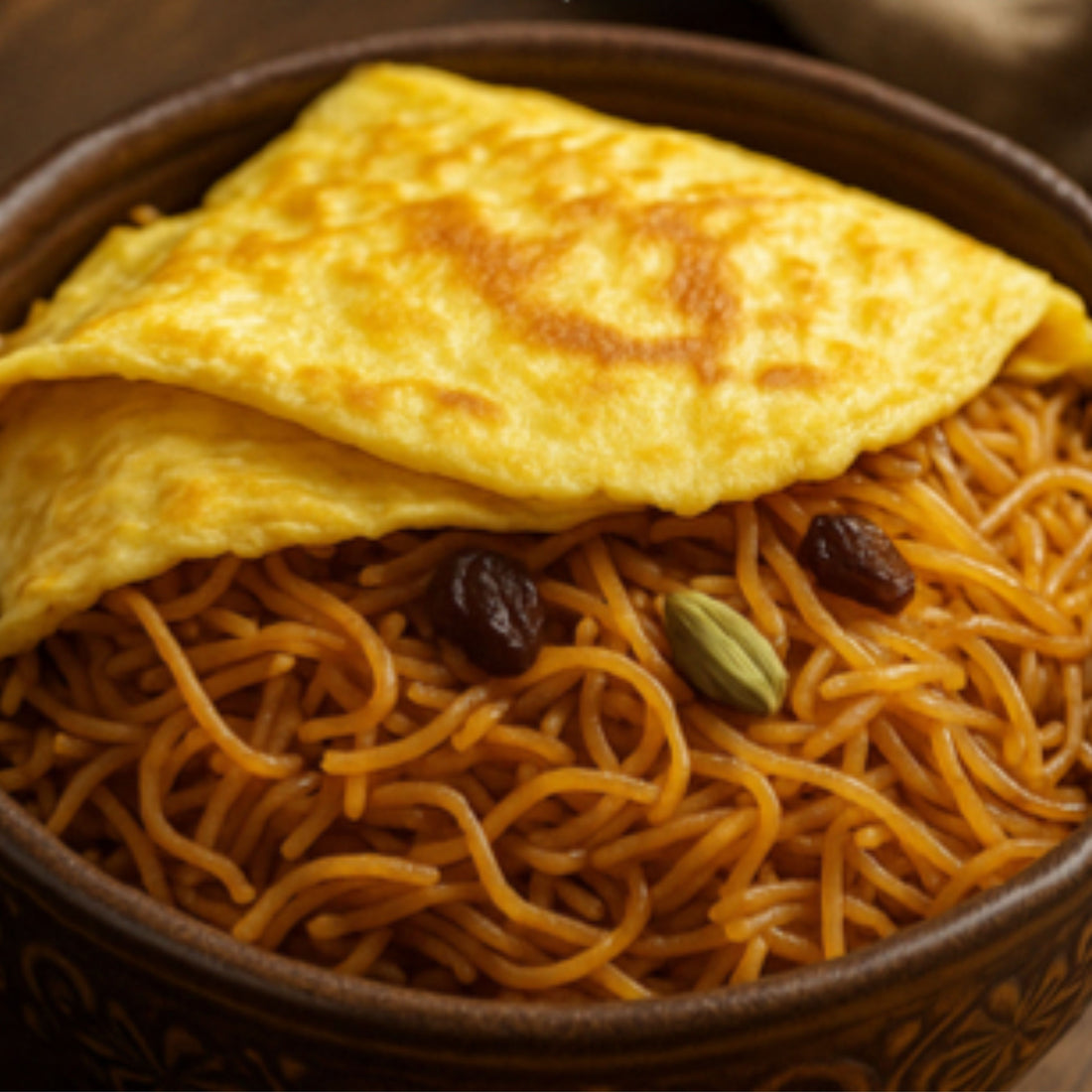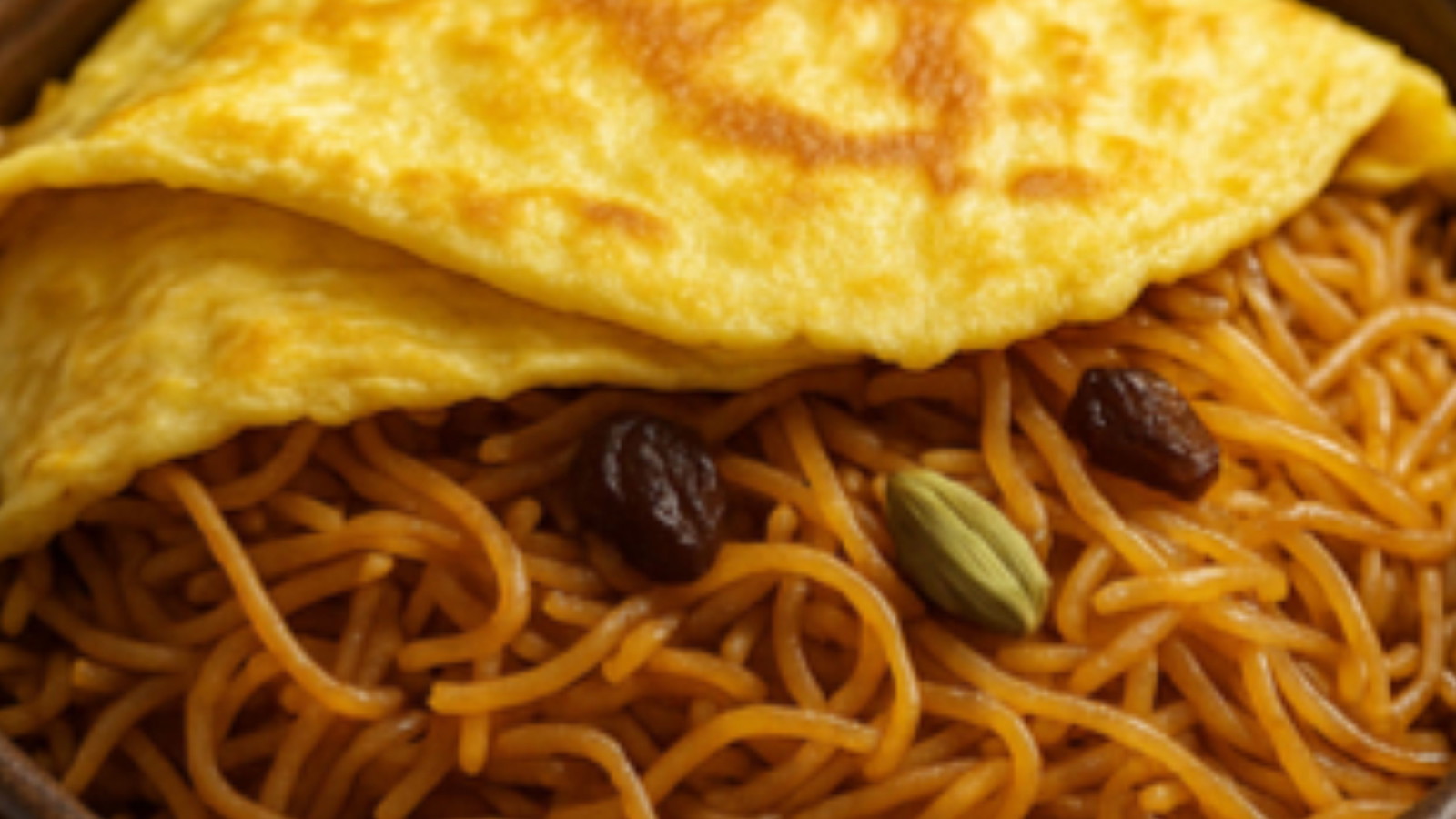
Balaleet – Kuwait’s Sweet & Savory Breakfast
Share
A Kuwaiti classic where saffron-scented vermicelli noodles meet a savory golden omelet. A breakfast full of contrasts, culture, and history.
Balaleet – Kuwait’s Sweet & Savory Breakfast (Kuwaiti Balaleet – البلاليط الكويتية)
Rated 5.0 stars by 1 users
Category
Breakfast
Cuisine
Kuwaiti
Author:
DaloolsKitchen
Servings
3-4
Prep Time
10 minutes
Cook Time
20 minutes
Balaleet is one of Kuwait’s most unique and beloved dishes, where opposites come together on the plate. Sweet, fragrant noodles made with saffron, cardamom, and rosewater are topped with a simple egg omelet. To outsiders, it might seem unusual, dessert-like noodles for breakfast with eggs, but in Kuwait, it’s a symbol of heritage, celebration, and family tradition.
The history of Balaleet reflects Kuwait’s place at the crossroads of trade. Vermicelli noodles traveled through India and Persia, saffron through Iran and Spain, while cardamom and rosewater came via spice routes through Arabia. In Kuwaiti kitchens, these global ingredients fused into something distinctively ours.
Most often, Balaleet is tied to Eid mornings. Families gather after dawn prayers, sharing steaming plates of saffron noodles with tea and milk before visiting relatives and celebrating the day. Across the Gulf you’ll find similar versions, in Bahrain, the UAE, Oman, and even southern Iran. But in Kuwait, Balaleet carries its own identity. It’s sweet and savory, festive yet humble, a dish that embodies both everyday comfort and special occasion joy.
That’s the story behind Balaleet — a dish that shows how global ingredients became woven into Kuwaiti heritage. And that’s a story worth tasting.
Love recipes like this? You’ll find even more authentic Kuwaiti dishes, along with their stories, in my cookbook collection — available here.

Ingredients
-
2 cups (200 g) vermicelli noodles
-
3 tbsp butter or ghee
-
½ cup sugar (adjust to taste)
-
¼ tsp saffron threads, steeped in 2 tbsp warm water or milk
-
½ tsp ground cardamom
-
2 tbsp rosewater (optional but traditional)
-
Pinch of salt
-
2–3 eggs
-
1 tbsp oil or butter for frying
Directions
Bring a pot of water to a boil. Add vermicelli noodles and cook until just tender (3–4 minutes). Drain well.
In a large pan, melt butter or ghee. Add the drained noodles, sugar, saffron water, cardamom, rosewater, and a pinch of salt. Toss gently until noodles are evenly coated and fragrant. Adjust sugar to taste.
In a separate skillet, heat oil or butter. Beat the eggs lightly with a pinch of salt, then cook into a thin omelet.
Place the sweet noodles on a serving dish and top with the omelet — whole or sliced into strips.
Serve warm, ideally with chai haleeb or Arabic coffee.
Recipe Note
Tradition: Balaleet is most often eaten on Eid mornings in Kuwait, but many families also enjoy it year-round as a breakfast or light meal.
Variations: Some families prefer it sweeter, others more fragrant with extra cardamom or rosewater. Adjust based on taste and family tradition.
Texture Tip: Don’t overcook the noodles — they should stay springy enough to hold the saffron-sugar coating.
Regional Connections: Similar dishes exist across the Gulf, but Kuwait’s Balaleet has its own flavor balance and cultural meaning.
Pairing: Best enjoyed with strong tea or Arabic coffee, which balance the sweetness and complete the experience.
